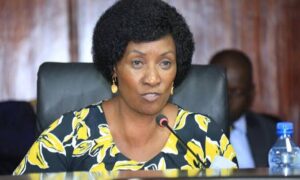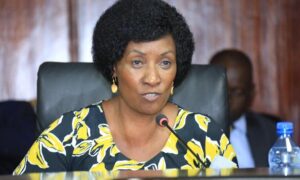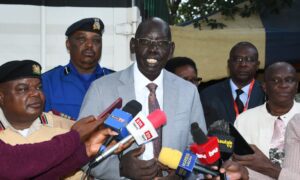Nairobi, Kenya – Sunday, 25th August 2024
In a significant development this afternoon, the Kenya National Union of Teachers (KNUT) has called off its planned nationwide teachers’ strike that was slated to begin on Monday, August 26, 2024. The strike cancellation comes after critical negotiations with the Teachers Service Commission (TSC) and the Ministry of Education, offering a reprieve to the education sector as the third term is set to begin.
The decision to postpone the strike was welcomed with relief by parents, guardians, and students who were anxiously awaiting news on whether schools would remain closed due to industrial action. Teachers, too, were eager to see their concerns addressed, primarily regarding the implementation of the second phase of the 2021-2025 Collective Bargaining Agreement (CBA), along with other pressing issues that have plagued the profession.
Government Commitment to Resolving Issues
In a press release obtained by K47 Digital News Team, the Ministry of Education expressed its appreciation to KNUT for showing “selfless patriotism” by calling off the strike. The statement underscored the government’s commitment to addressing teachers’ concerns, even as it operates within challenging fiscal conditions.
“Earlier this afternoon, the Kenya National Union of Teachers called off the strike initially planned for Monday, 26th August, 2024. We are grateful to our teachers and their leaders for their selfless act of patriotism, prioritizing the interests of learners. We assure our teachers of the Government’s genuine commitment to addressing all their legitimate concerns, notwithstanding the limiting fiscal space within which we are operating as a country,” the statement read.
The Ministry further highlighted that resources have been allocated for the implementation of the second phase of the 2021-2025 CBA, effective from July 1, 2024. This agreement is intended to provide better remuneration and improved working conditions for teachers across the country.
The Ministry also noted that resources have been made available for the retooling of teachers to support the ongoing implementation of the Competency-Based Curriculum (CBC). This program is a critical component of Kenya’s education reform, designed to equip learners with practical skills and knowledge in a more learner-centric approach. By investing in the professional development of teachers, the Ministry aims to ensure the successful integration of CBC into all schools.
A Collaborative Effort for a Conducive Learning Environment
Acknowledging the need for a collaborative approach to resolve the issues raised by KNUT, the Ministry’s statement expressed optimism that through continued dialogue and cooperation, stakeholders would be able to create a conducive environment for both teachers and learners.
“Through a consultative approach with all stakeholders, we will work together to achieve a satisfactory resolution of all outstanding matters, to enhance a conducive and favorable working environment for our dedicated teachers,” the statement continued.
This collective effort is seen as essential for the stability of the education sector, which has faced numerous challenges in recent years, including the transition to CBC, funding constraints, and the need for infrastructure improvements across many schools in the country. The government’s renewed commitment to addressing these issues is a positive step forward, although the full resolution of teachers’ demands may still take some time.
Schools Set to Reopen for Third Term on August 26
With the strike called off, the Ministry of Education confirmed that schools would reopen for the third term as scheduled on Monday, August 26, 2024. In light of this, the Ministry has urged parents and guardians to ensure their children return to school promptly to avoid any disruption in their education.
The statement also provided reassurance that funds have been released to facilitate the smooth running of schools across the country. The Ministry confirmed that Ksh. 21.8 billion has been disbursed as capitation to all basic education institutions, ensuring that schools are ready to resume operations without delay.
This funding is critical for the functioning of schools, especially in public institutions where capitation funds are used to cover essential expenses such as learning materials, infrastructure maintenance, and co-curricular activities. Ensuring that these resources are available ahead of the new term will be instrumental in providing a stable and supportive environment for learners and teachers alike.
The Role of Collective Bargaining in Teachers’ Welfare
The decision by KNUT to postpone the strike highlights the importance of collective bargaining in the teaching profession. The 2021-2025 CBA, negotiated between KNUT and TSC, outlines the key priorities for improving the conditions of service for teachers, including salary adjustments, promotions, and better working conditions.
While the government has made strides in implementing portions of the agreement, KNUT has remained vocal in demanding full compliance with the CBA’s provisions. At the core of their demands is the implementation of the second phase, which includes a salary increment that was agreed upon in 2021. Delays in executing this portion of the agreement have been a source of frustration for many teachers, leading to the planned industrial action.
KNUT Secretary-General Collins Oyuu, who has been at the forefront of negotiations with the TSC, expressed cautious optimism following the decision to call off the strike. Speaking to the press, he reiterated the union’s commitment to ensuring that teachers’ rights are upheld and that the government honors its obligations under the CBA.
“While we have called off the strike for now, we are monitoring the situation closely. The government must demonstrate its seriousness in addressing our concerns, or we will not hesitate to take further action if necessary,” said Oyuu.
Looking Ahead: A Hopeful Future for Kenya’s Education Sector
As schools prepare to open their doors for the third term, there is a sense of cautious optimism within the education community. The decision by KNUT to suspend the strike provides a window of opportunity for further dialogue and collaboration between the union, TSC, and the Ministry of Education.
For now, the priority remains on ensuring that the 2021-2025 CBA is fully implemented and that teachers are given the support they need to carry out their duties effectively. At the same time, there is a recognition that addressing the broader challenges facing the education sector, such as underfunding, inadequate infrastructure, and teacher shortages, will require sustained effort and investment from the government.
As Kenya continues to navigate its education reforms, particularly the rollout of the CBC, the role of teachers cannot be understated. Ensuring their well-being, professional development, and job satisfaction will be critical to the success of these reforms and the future of the country’s education system.
For now, students, parents, and teachers can breathe a sigh of relief, knowing that the third term will commence without disruption. The coming weeks will be crucial in determining whether the government can meet its commitments to teachers and pave the way for a more stable and prosperous education system in Kenya.























